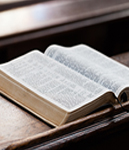
The book of Psalms is a collection of Hebrew poetry, the production of various authors throughout the whole of their national life from Moses to the time of Nehemiah; but chiefly from the time of David.
It is accepted as being divided into five parts, made up of five separate collections from the time of David onwards, the end of each of which is indicated by a doxology. This division is believed to have originated with David himself, who, as Jewish tradition asserts, gathered together the first part for use in the service of the Tabernacle when he organised the choir of singers from the Levites – 1 Chronicles 25. The final completion of the remainder being made when the Book was arranged in its present form, possibly by Ezra.
Of the 150 psalms which it contains, 73 have been assigned to David, one to Moses, 2 to Solomon, 25 to the chief singers; the remainder being anonymous, but written most probably in the later years of the monarchy, during the captivity in Babylon, and after the return. Those in the first part, ending with the 41st psalm, are all assigned to David, with the exception of four, which are also believed to be by him. The Second part, ending with the 72nd psalm, contains 21 by David, the remainder being written by the “singers”, the last being Solomon’s.
In the third part, ending with the 89th psalm, there is only one by David, the rest being Levitic. In the fourth part, ending with the 106th, two are by David, one by Moses (the 90th), the remainder being anonymous. In the fifth part, ending with the last psalm, there are 15 by David, one by Solomon, the rest anonymous – but many of them evidently belonging to the captivity and return. Psalms 120 to 134 are styled “Song of Degrees,” or “Songs of Upgoings” – being sung by the people as they ascended the hill of Zion to the feasts.
The chief characteristics of the Book of Psalms, in addition to their intense national expression, are their deep spiritual feeling, keen sense of individual sinfulness in the sight of God, a recognition of His greatness, and a conviction of His pardoning mercies. There is also a distinct apprehension of the promise and coming of Messiah, and many prophetic declarations of His mission, sufferings, and death. And whilst these features are visible in nearly all of them, they are most clear in those which are ascribed to and acknowledged to be by David. Hence the Book has been adopted as a most precious possession of the Christian Church, and its language has ever been the vehicle of its prayers and praises. In the various experiences of a Christian’s life, he can at all times turn to this Book and draw from its sacred outpourings materials of hope and comfort and consolations, coupled with touching lessons of submission the the Divine will.
No portion of the Sacred Scriptures is so frequently referred to and quoted from in the New Testament. No other portion is so readily used with direct reference to the Messiah. Nearly one half of all the quotations referring to the Christ as displayed in the Old Testament are taken from the Psalter – our Lord Himself, in His dying agony upon the Cross, adopting and repeating as His own the first verse of the 22nd psalm, “My God, my God, why has thou forsaken me?”
“To render thanks unto the Lord it is a comely thing,
And to thy name, O thou most High,
due praise aloud to sing.”
Courtesy of Wicket Gate Magazine
